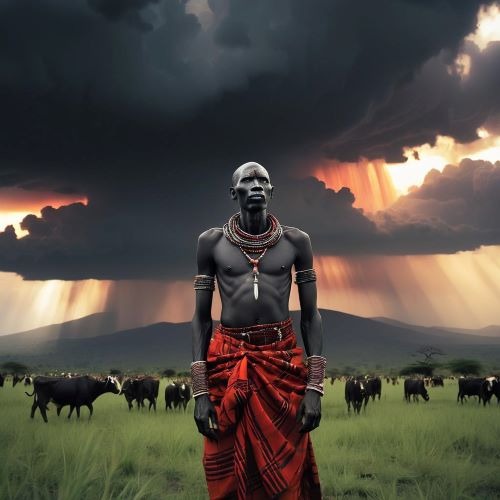Long before city lights or traffic horns echoed across East Africa, before borders and skyscrapers, the Maasai people had a story. A story passed down through generations not with books, but around fires, under stars, in the rhythm of chants and the stillness of silence. This story isn’t just about where the Maasai came from. It’s about their bond with cattle, their god Enkai, and a worldview that still shapes their way of life.
At the center of the Maasai universe is Enkai (sometimes called Engai), the Supreme Creator. Enkai is not just a god of the skies or a distant being floating above the clouds. Enkai is both male and female, merciful and fierce, a force present in rain, thunder, and birth. Enkai is life.
According to the Maasai, when the world was new, Enkai made the first human being, a man named Maasinta. But the world was bare. It had no livestock, no herds, no source of sustenance. So Maasinta pleaded with Enkai for help. Enkai heard his prayer and, in an act of divine generosity, let down a long leather rope from the sky. Through it, Enkai sent cattle directly from heaven. The cattle descended like blessings—majestic, sacred, and theirs.
But the story takes a turn.
Another man, Enkai’s neighbor and Maasinta’s rival, grew envious. He wanted cattle too. Instead of asking respectfully, he tried to cut his own rope to heaven to steal them. Furious at the betrayal, Enkai severed the heavenly link forever. From that moment on, cattle would no longer descend from the skies. What the Maasai had, was all that would ever be.
This is why, to this day, the Maasai believe that all the world’s cattle were given to them by Enkai. It’s not just a claim of ownership—it’s a spiritual truth. Cattle are more than animals. They are a direct gift from God, a symbol of life, wealth, status, and divine favor. Every cow in a Maasai homestead carries that sacred history in its hide.
Even today, Maasai ceremonies—from births and marriages to rites of passage and blessings—feature cattle at the center. The people don’t just herd cows. They live with them, speak to them, name them. The milk feeds their children, the hides warm their bodies, and the dung seals their homes. But perhaps even more importantly, their stories—like this one—remind them of who they are and where they come from.
In a world rushing forward with tech and towers, the Maasai creation story stands as a quiet, powerful reminder: some things, like belief and identity, are rooted deep. You don’t need a satellite signal to feel the pull of heaven when you’re walking the earth with cattle given by the gods.


I have not checked in here for some time because I thought it was getting boring, but the last several posts are good quality so I guess I?¦ll add you back to my daily bloglist. You deserve it my friend 🙂
Thanks a lot. I’m glad the recent posts changed your mind. Happy to be back on your daily bloglist—it really means a lot.